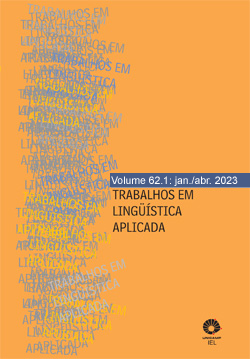Abstract
Technologies transformed the way of producing and acquiring knowledge. The pandemic proved that now they ought to be a part of the classroom. However, it is still needed that the teacher experiences using such technologies to, then, work with them. Starting from the notion that it is necessary to develop new abilities in order to be digitally literate (KARCHMER-KLEIN; SHINAS, 2012), and considering that identities are shaped by experience (IVANIC, 1998), this paper aims to understand how five students of a Graduate Program in Applied Linguistics, already experienced teachers, while writing, build their identities and reflect upon technology’s relation with the school. Therefore, it was analyzed the journals produced during a class focused on digital literacy, in which the students had to read the theory and experiment with a digital tool. It is concluded that curiosity is one of the key elements to developing digital literacy and computational thinking, and that it is through attempting that the educator improves their knowledge and acquires confidence to incorporate new digital tools in the classroom.
References
AVGERINOU, Maria D.; PETTERSSON, Rune. Design of a Visual Literacy Podcast. In: GRIFFIN, R. E.; AVGERINOU, M; GIESEN, J. History, Community, & Culture -Celebrating Tradition and Transforming The Future: Selected Readings of the International Visual Literacy Association. International Visual Literacy Association, 2007. Disponível em: https://www.researchgate.net/publication/281819692_Design_of_a_Visual_Literacy_Podcast Acesso em: 11 jan. 2021.
DARVIN, Ron. Language and identity in the digital age. In: The Routledge Handbook of Language and Identity. Routledge, 2015. v. 1, cap. 33, p. 523-540. Disponível em: https://www.researchgate.net/publication/303838217_Language_and_identity_in_the_digital_age Acesso em: 11 jan. 2021.
DE FINA, Anna; GEORGAKOPOULOU, Alexandra. Analysing narratives as practices. Qualitative Research, v. 8 (3), p. 379-387, 2008. Disponível em: https://www.researchgate.net/publication/249731280_Analysing_narratives_as_practices Acesso em: 09 set. 2019.
DUDENEY, Gavin.; HOCKLY, Nicky.; PREGUM, Mark. Letramentos Digitais. Trad. Marcos Marciolino.1.ed. São Paulo: Parábola Editorial, 2016.
IVANIČ, Roz, Writing and Identity: the discoursal construction of identity in academic writing. John Benjamins Publishing, 1998, p. 96.
KARCHMER-KLEIN, Rachel; SHINAS, Valeria Harlow. Multimodal texts in the context of an online graduate-level literacy and technology course. Research in the schools: Mid-South Educational Research Association, v. 19, n. 1, p. 60-74, 2012. Disponível em: https://www.researchgate.net/publication/280831840_21st_century_literacies_in_teacher_education_Investigating_multimodal_texts_in_the_context_of_an_online_graduate-level_literacy_and_technology_course Acesso em: 11 jan. 2021.
PIGNATO, Stephanie. The benefits of podcasting in the literacy classroom. Orientador: Dr. Joellen Maples. 2010. 48 p. Tese (Mestrado em Educação) - St. John Fisher College, Nova York, 2010. Disponível em: https://fisherpub.sjfc.edu/education_ETD_masters?utm_source=fisherpub.sjfc.edu%2Feducation_ETD_masters%2F17&utm_medium=PDF&utm_campaign=PDFCoverPages Acesso em: 11 jan. 2021.
ROBIN, Bernard R. Digital storytelling: a powerful technology tool for the 21st century classroom. Theory Into Practice, v. 47, p. 220-228, 2008. Disponível em: https://digitalstorytellingclass.pbworks.com/f/Digital+Storytelling+A+Powerful.pdf Acesso em: 08 mai. 2020.
UNSWORTH, Len. Changing dimensions of school literacies. In: UNSWORTH, Len. Teaching multiliteracies across the curriculum: changing contexts of text and image in classroom practice. Philadelphia: Open University Press, 2001. cap. 1, p. 07-21.
WING, Jeannette M. Computational thinking and thinking about computing. Philosophical Transactions of the Royal Society A, v. 366, p. 3717-3725, 31 jul. 2008. Disponível em: https://royalsocietypublishing.org/doi/10.1098/rsta.2008.0118 Acesso em: 11 jan. 2021.
WING, Jeannette M. Computational thinking: it represents a universally applicable attitude and skill set everyone, not just computer scientists, would be eager to learn and use. Communications of the ACM, v. 49, ed. 3, p. 33-35, Março 2006. Disponível em: https://www.researchgate.net/publication/274309848_Computational_Thinking Acesso em: 11 jan. 2021.
XAVIER, Antonio Carlos dos Santos. Letramento digital e ensino. Núcleo de estudos de hipertexto e tecnologia educacional, p. 1-9, 2005. Disponível em: http://www.nehte.com.br/artigos/Letramento-Digital-Xavier.pdf. Acesso em: 11 dez. 2020.
YUEN, Allan H. K.; MA, Will W. K. Exploring teacher acceptance of e-learning technology. Asia-Pacific Journal of Teacher Education, v. 36, n. 3, p. 229-243, Agosto 2008. Disponível em: https://www.researchgate.net/publication/248984613_Exploring_teacher_acceptance_of_e-learning_technology Acesso em: 11 jan. 2021.
ZANETTIL, Humberto A. P. et al. Pensamento computacional no ensino de programação: uma revisão sistemática da literatura brasileira. Anais do XXVII Simpósio Brasileiro de Informática na Educação, p. 21-30, 2016. Disponível em: https://www.br-ie.org/pub/index.php/sbie/article/view/6677 Acesso em: 11 jan. 2021.

This work is licensed under a Creative Commons Attribution 4.0 International License.
Copyright (c) 2023 Trabalhos em Linguística Aplicada


